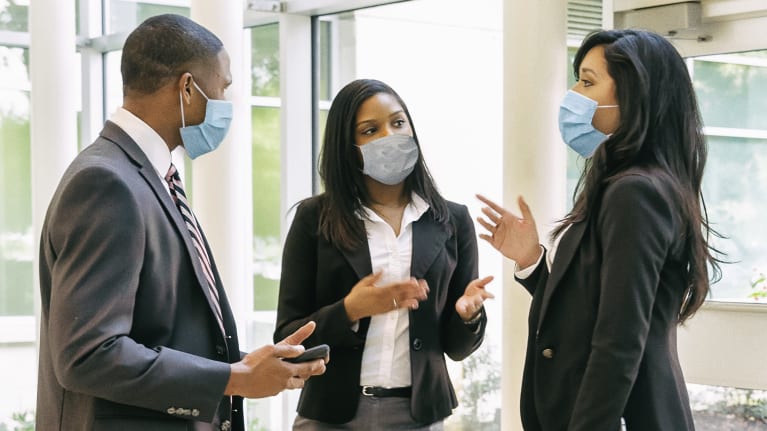
First published by Safety+Health an NSC publication.
Wearing a facemask to help prevent the spread of COVID-19 can present obstacles to communication, “an important and complex transaction that depends on visual and, often, auditory cues,” says Debara L. Tucci, director of the National Institute on Deafness and Other Communication Disorders.
When facial coverings are worn, facial features are obscured, while speech perception and conveyed emotion are disrupted. Facial coverings also filter speech, making sounds less clear, Tucci said, adding, “When it is harder to understand speech – whether because of cloth face coverings, distance or other factors – research suggests that we have fewer cognitive resources to process information deeply. As a result, communication suffers, and feelings of stress and isolation may increase.”
NIDCD offers the following tips to improve communication when wearing a facial covering:
Be aware. Is the person you’re communicating with having trouble understanding you? Ask and adapt if needed.
Be patient. Facial coverings block visual cues and muffle sounds that help us understand speech, which can make interactions frustrating.
Be mindful. Consider how physical distancing might affect your communication. As distance increases, sound levels decrease and visual cues are more difficult to see.
Be loud and clear. Speak up, but don’t shout. Focus on speaking clearly. Consider wearing a clear facial covering, if possible. If you’re having trouble understanding, ask the person you’re talking with to speak louder. If you lip-read, ask those you interact with regularly to wear a clear facial covering.
Turn down the background volume. Background noise can make conversation especially hard. Move to a quieter spot or turn down the sound, when possible.
Communicate another way. Use a smartphone talk-to-text app or writing tools (e.g., paper/pen, whiteboard) to communicate.
Confirm your statement is clear. Ask if your message has been understood.
Bring a friend or be a friend. If it’s essential that you comprehend important spoken details – during a discussion with a health care provider, for example – consider bringing a friend or family member with you.
McCraren Compliance assists employers in protecting their workers, starting with a comprehensive Work-site Analysis, Hazard Prevention, Controls, and Safety & Health Training.


